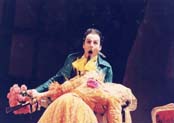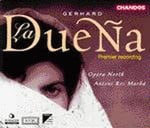OPERA SEARCH

The Duenna
(La Dueña) (1945-49)Libretto by the composer and Christopher Hassall after Richard Brinsley Sheridan's comedy (E,G). Performing Edition (1991) by David Drew.
Major roles: S,2M,2T,2Bar,B; small roles: T,B,3speakers;
chorus; dancers
2.picc.2.corA.2.bcl.2-4.2.2.euph.1-timp.perc(3):xyl/cast/rattle/
3Chin.tom-t/Korean tpl.bl/tamb/SD/BD/cyms/2susp.cyms/tam-t-
cel-harp-strings
Abbreviations (PDF)
Boosey & Hawkes
Teatro Lirico Nacional, Madrid
Felicity Palmer, David Rendall, Anthony Michaels-Moore, Richard van Allan, Dir: Jose-Carlos Plaza
Conductor: Antoni Ros Marba
Company: Madrid Opera
| DON JEROME, a nobleman of Seville | Bass |
| DON FERDINAND, his son, in love with Donna Clara | Baritone |
| DONNA LUISA, his daughter | Soprano |
| THE DUENNA, her chaperone | Mezzo-Soprano |
| DON ANTONIO, in love with Donna Luisa | Tenor |
| DONNA CLARA D'ALMANZA | Mezzo-Soprano |
| DON ISAAC, a Portuguese Jew, Don Jerome's intended son-in-law | Baritone |
| FATHER PAUL | Tenor |
| LOPEZ, servant to Don Jerome's household | Speaking role |
| Servant to Don Antonio | Speaking role |
| Maid to Donna Luisa | Speaking role |
| Gypsy | Soprano |
| Brethren of Deadly Sin | Tenor/Baritone |
| Ladies and Gentlemen of Fashion, Townspeople, Beggars | SATB |
| Strumpet, Cavalier, Bawd, 2 Beaux, Friars, Wench, Cardinal and Priests, Lady in a Sedan Chair, Dancers and Players, Gypsy Children | Non-singing parts |
Seville, 18th century, between dawn and evening
The Seville merchant Don Jerome intends to marry off his daughter Luisa to Don Isaac, a wealthy but unprepossessing Portuguese Jew, and has driven away her true love, the penniless Don Antonio. Meanwhile Donna Clara, whom Luisa’s brother Ferdinand loves, has run away to avoid being immured in a convent by her tyrannical stepmother. Luisa conspires with her formidable Duenna to fool Don Jerome: they exchange clothes and provoke him to evict the supposed Duenna and lock up ‘Luisa’, thus freeing the true Luisa to look for Antonio, and lining up the Duenna to win her fortune by fascinating and enveigling the hapless Isaac.
Searching for Antonio, Luisa meets up with the runaway Clara; then encounters and enlists the aid of Isaac (who has never seen her before) by pretending to be Clara in love with Antonio. Seeing a way of disposing of his rival, Isaac agrees to bring Antonio to her. His own courting of the ugly ‘Luisa’ (the disguised Duenna) takes a turn for the better when she tells him she will only marry him if they elope together, and he realizes that thus he can avoid making an expensive marriage settlement. Having established ‘Clara’ (the real Luisa) in his lodgings, he brings Antonio to her and is overjoyed when the lovers agree that ‘Luisa’ (The Duenna) can be his.
Complications ensue when Ferdinand believes that his friend Antonio is about to filch his beloved Clara; but in the end both pairs of lovers are married at a priory, the Duenna gets Isaac, and all schemes are revealed and celebrated at the house of the thoroughly outwitted Don Jerome.
As an operatic project, The Duenna provided Gerhard with the perfect combination of an English play on a Spanish subject, reuniting the split cultural aspects of his life. He was drawn by Sheridan's sparkling, comic dialogue, but also by the Seville setting with "its colour and atmosphere, its social climate; wealth and fashion rubbing elbows with beggars, gypsies and picaresque rogues". Gerhard's only opera was a labour of love in straitened circumstances, uncommissioned with little hope of staging, but it achieved a radio concert performance in 1949 with a cast including Peter Pears. The Duenna was finally acclaimed on the stage in 1992, more than 20 years after Gerhard's death, thanks to the performing edition by David Drew, with a production shared between the Teatro Lirico Nacional in Madrid, the Gran Teatre del Liceu in Barcelona and Opera North in Leeds.
Comic, Poetic, Romantic

Claire Powell/Neill Archer/Richard van Allan/Adrian Clarke/Eric Roberts/Susannah Glanville/Opera North/English Northern Philharmonia/Antoni Ros Marbà
Chandos CHAN 9520
